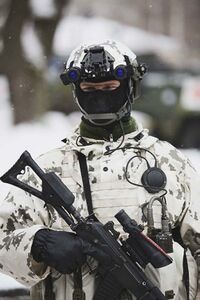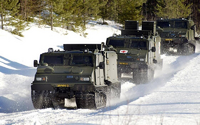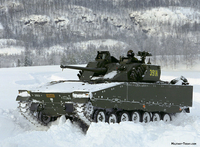Ruvelkan Imperial Fusiliers
This article is incomplete because it is pending further input from participants, or it is a work-in-progress by one author. Please comment on this article's talk page to share your input, comments and questions. Note: To contribute to this article, you may need to seek help from the author(s) of this page. |
| Imperial Fusiliers | |
|---|---|
 | |
| Active | 30 June 1715 - Present (309 years, 4 months) |
| Country | |
| Type | Airborne forces |
| Role | Light infantry Airborne infantry Airmobile infantry |
| Size | 65,000 active duty personnel |
| Part of | Imperial Armed Forces of Ruvelka |
| Headquarters | Hajdúböszörmény Fusilier Staging Base, Hajdúböszörmény, Debrecen District |
| Motto(s) | “First to the fight.” |
| Commanders | |
| Current commander | Júlia Szalai |
| Deputy commander | Melkon Ghukasyan |
| Insignia | |
| Official Flag |  |
| Identification Symbol |  |
The Ruvelkan Imperial Fusiliers is a branch of the Ruvelkan Armed Forces responsible for providing a mobile reaction force from the air, using the mobility of the Imperial Air Force to rapidly deploy its task forces. It is one of five uniformed services of Ruvelka and consists of 65,000 active duty personnel as of March 2020.
The Fusiliers are considered to be the Principality’s most elite military branch. Since their foundation, their overall mission has evolved drastically, warranting adaptive military doctrine as the nature of conflict changed. The Imperial Fusiliers have served in every Ruvelkan armed conflict since the time of the Ruvelkan Imperium and have attained prominence in Tyran for its proficiency in the practices of aerial troop deployment and applying the same concept to modern infantry fighting vehicles and light tanks. Due to its ability to rapidly deploy, it is an important factor in the implementation of Ruvelkan battle doctrine.
Mission
The RIF serves as Ruvelka's quick reaction force-in-readiness with responsibilities that include—but are not limited to—the defense of air bases in support of Ruvelkan aerial campaigns and the development of strategies and techniques to further improve the Fusiliers’ ability to perform strategic aerial deployments. It falls under the direct influence of Ruvelka's General Staff and is also required to perform duties dictated by their command.
Capabilities
The Imperial Fusiliers fulfill the vital role of a highly capable air-ground combined arms task force able to perform strategic deployments by tactical airdrop. It is capable of engaging in asymmetric warfare against conventional, irregular, and hybrid forces. The most basic structure of a deployed unit is the Fusilier Combined Task Forces that combine a ground and aerial combat battalion supported by a logistics element and under a dedicated command structure.
Fusilier Aviation is an integral component in the implementation of Fusilier air assault doctrine by providing VTOL transportation as well as close air support; the Fusilier Aviation helicopter fleet allows the RIF to provide power projection from the air. The Fusiliers are credited with the development of the Ruvelkan Armed Forces’ doctrine of helicopter insertion and its eventual employment in maneuver-warfare strategies.
Training for the RIF focuses heavily on the capability of the singular soldier with a specific emphasis of infantry combat. Regardless of a Fusilier’s previous specialization, all individuals receive advanced rifleman training with officers receiving additional command and leadership courses when necessary. Fusilier Commanders encourage their troops to carry out their orders by any method deemed most effective.
History
Origins
The Imperial Fusiliers were originally conceived as a force of elite irregular infantry that would scout and engage enemy forces prior to the arrival of the main army. Upon its foundation, the original ranks of the Fusiliers were occupied by veteran infantry and marksmen of the Imperial Army.
Ruvelkan Imperium
Ruvelkan Socialist Republic
Ruvelkan Civil War and Siduri War
Modern Day
Organization
As opposed to the other branches of the Ruvelkan Armed Forces, the Imperial Fusiliers possess a unique command structure. Factoring in that the Fusiliers are professionally trained troops in contrast to to Ruvelka's compulsory servicemen and women, the RIF utilizes a decidedly less structured and more flexible form of leadership. Command of the Imperial Fusiliers is an appointed position via the General Staff and is currently held by Lieutenant-General Júlia Szalai.
Operating Divisions
Personnel
As the smallest division of the Imperial Armed Forces of Ruvelka, the Fusiliers only operate and maintain a handful of training facilities across the country. There are no schools dedicated to the Fusiliers. The program for the RIF is known to be considerably difficult with a characteristically small number of new troops each year.
Officer Ranks
| Officer Ranks of the Ruvelkan Imperial Fusiliers | ||||||||||||
|---|---|---|---|---|---|---|---|---|---|---|---|---|
| Shoulder insignia | 
|

|

|

|

|

|

|

|

|

| ||
| Title Ruvelkan |
Chief Regimental Commander Vezérezredes |
Vice Field Marshal Altábornagy |
Lead Guard-Major Vezérőrnagy |
Brigade-General Dandártábornok |
Regimental Leader Ezredes |
Junior Regimental Leader Alezredes |
Guard-Major Őrnagy |
Centurion Százados |
Chief Military-Major Főhadnagy |
Military-Major Hadnagy | ||
| Equivalent Ranks | General | Lieutenant-General | Major General | Brigadier General | Colonel | Lieutenant-Colonel | Major | Captain | First Lieutenant | Second Lieutenant | ||
Enlisted Ranks
| Enlisted Ranks of the Ruvelkan Imperial Fusiliers | ||||||||||||
|---|---|---|---|---|---|---|---|---|---|---|---|---|
| Shoulder insignia | 
|

|

|

|

|

|

|

|

|

| ||
| Title Ruvelkan |
Chief Staff Ensign Főtörzszászlós |
Staff Ensign Törzszászlós |
Ensign Zászlós |
Chief Staff Guard-Master Főtörzsőrmester |
Staff Guard-Master Törzsőrmester |
Guard-Master Őrmester |
Platoon-Leader Szakaszvezető |
Decurion Tizedes |
Guard-Leader Őrvezető |
Homeland-Defender Közkatona | ||
| Equivalent Ranks | Chief Warrant Officer | Senior Warrant Officer | Warrant Officer | Sergeant First Class | Staff Sergeant | Sergeant | Corporal | Private First Class | Private (PV2) | Private (PV1) | ||
Notable Ruvelkan Fusiliers
- Kátálin Dorman (30 April 1880 – 12 June 1962), leader of Imperial Forces during the Ruvelkan Civil War and is considered to be one of the founders of modern Ruvelka; she served as the second Chancellor of the Principality’s Federal Assembly.
- Monika Prohászka (born 8 August 1991), Monika served during the Zemplen War and is the current Royal Princess of Ruvelka.
Bases
The Fusiliers operate a number of major bases, most of which host operating forces with several other support and training stations throughout Ruvelka. Bases are concentrated in strategic locations throughout the nation that allow for rapid-deployment corridors for the Fusilier quick reaction forces. The majority of units are stationed at Fusilier Base Hajdúböszörmény due to its central location in Ruvelka's most concentrated area.
Equipment
The Fusiliers are well-equipped and well-trained soldiers, often receiving priority for the newest equipment to enter production. A soldier of the RIF represents a considerable investment and the Principality, alongside its corresponding ruling bodies, put significant emphasis on providing Fusiliers with the most effective training the military can provide.
Infantry Weapons
The basic infantry weapon of the Fusiliers is the G88 assault rifle which is supplemented by the ÚHP and the Cacertian Vitali 07. The standard side arm is the K6 handgun, usually in 9×19mm Parabellum although the new K6v2 chambered in 5.7×28mm is becoming increasingly more common. Man-portable grenade launchers provide indirect firepower, with mortars utilized in special cases. A varying number of sniper rifles and anti-materiel rifles are used to provide precision fire with DMRs growing more and more common.
The Fusiliers utilize a number of man-portable recoilless rifles and direct-fire missiles to provide infantry squads with anti-armor capabilities. The SMRR is the standard-issue high-explosive weapon and is capable of heavily damaging armor and fixed defenses. For special operations requiring a lighter load, the Fusiliers utilize the LATW—a single-shot, disposable unguided weapon system.
Ground Vehicles
The Fusiliers operate the many of the same light vehicles, tanks, and infantry fighting vehicles as the Imperial Army. They are characterized for heavily relying on Armored Crawlers, 6×6, and 8×8 APCs for their mobility. Most, if not all, of these vehicles are capable of being airdropped by the Imperial Air Force for tactical insertion. In more recent years, the RIF has begun adopting more modern IFVs for use in their rapid-deployment strategies, most notably the domestically designed and produced Uhlan IFVs. The Uhlans, which can easily be reconfigured between light tank armament and IFV weaponry, makes the majority of the Fusiliers' armored fighting capabilities.
Aircraft
The aerial capabilities of the Imperial Fusiliers is essential to its overall mission and doctrine. They operate a large number of both rotary-wing and fixed-wing aircraft which are used in a variety of roles ranging from assault support and close air support to strategic transportation and air-lifting capabilities. The largest contingent of Fusilier Aviation consists of HH1 gunships which serve the dual role of combat transport and attack helicopter.
Relationship with Other Services
The RIF is characterized by sharing its responsibilities and resources with the other branches of the Ruvelkan military. The Fusiliers, however, have gone so far as enabling themselves to operate independently in regards to its assigned missions. Although the RIF possesses fewer bases than the other branches, Army, Air Force, and Navy bases all have facilities to accommodate a Fusilier presence.
Ruvelkan Imperial Army
The combat capabilities of the Imperial Fusiliers often overlap with those of the Imperial Army. Historically, the Fusiliers were originally a sub-unit of the Army and therefore share a close professional relationship with the modern-day branch of the RIF. The RIA is primarily made up of compulsory and conscripted military personnel and is often a follow-up force deployed in the wake of an RIF operation. The RIF, despite their far superior training, is a considerably smaller force and therefore requires the massed firepower of the Army during extended conflicts.
Ruvelkan Imperial Air Force
The modern mission of the Imperial Fusiliers requires them to operate closely with Ruvelka's Imperial Air Force. Several operations have constituted a joint deployment of Fusilier and Air Force transport aircraft to effectively deploy parachuted Fusilier troopers and light armor. Much like the RIA's role in conjunction with the RIF, the RIAF is required to work closely with the Fusiliers to provide air superiority and close ground support when RIF aviation is deemed inadequate.


